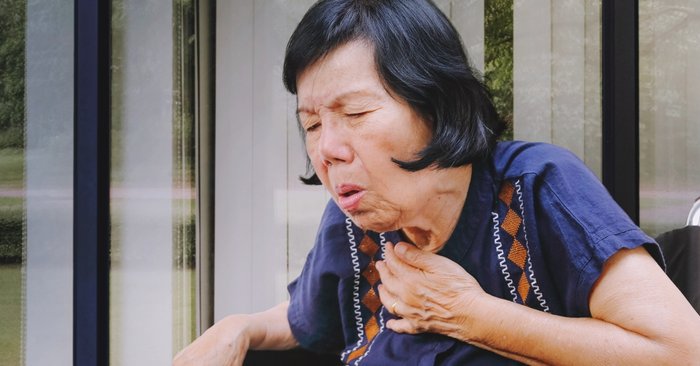-
In the elderly over 60 years, mortality is found withLung infection From choking up to almost 30%
-
Silent choking has no symptoms. If careless and not known if food or drinking water is aspirated into the airways. Can cause complications Infectious pneumonia (Aspiration pneumonia) which can lead to death.
-
If the elderly have fever, cough, phlegm, difficulty breathing or gasping for breath Sore, angina, and angina may be a dangerous sign of choking, leading to bronchitis or infectious pneumonia. Stop feeding by mouth and see a medical professional immediately.
Silent aspiration is the act of choking food or drinking water into the airways without coughing or wet voices. This is a common condition in patients with swallowing disorders. Can be born at any age
Silent choking and dysphagia in the elderly
Dr. Kanit Pongpipatpaiboon Physician in the field of rehabilitation medicine, Samitivej Srinakarin Hospital, indicated that the elderly with neurological diseases such as stroke, Parkinson’s, dementia were found to have dysphagia up to 50-75%, and 40-70% were found to have silent choking. Resulting in severe pneumonia followed by In the case of the elderly who have already infected pneumonia It was found to have silent choking up to 71% and in the elderly over 60 years the death rate was almost 30% with aspiration pneumonia.
Invisible symptoms of silent choking
Since the choking is silent, there are no symptoms. This causes the patient, including the caregiver, to be indifferent and unaware that food or drinking water is aspirated into the airways. Until complications arise Have serious disorders such as aspiration pneumonia, which can lead to death
In addition, silent choking may not be detected on clinical examination. Because there were no symptoms during the screening and physical examination Therefore, it is necessary to be evaluated by a team of medical professionals. By ingestion of powder by radiation or endoscopy to determine whether the patient is choking and prevent and treat it promptly.
In the case of silent suffocation leading to bronchitis or infectious pneumonia. There may be the following symptoms.
- Fever, cough, phlegm
- Difficulty breathing or gasping for breath
- Pain in the chest
- Seep down
When these signs are found, they must stop feeding them by mouth and seek medical attention immediately.
How do you notice that the elderly have difficulty swallowing?
- Unable to swallow Or always drooling
- There is residue in the mouth.
- Often complaining of “can’t swallow”, feeling like a lump in the throat
- Having to swallow repeatedly
- Coughing or choking while eating or drinking
- Food and water rehydrate after swallowing.
- Eat less, lose weight
How to prevent silent choking
When the patient has been examined A team of medical professionals will treat dysphagia according to the problems they encounter to prevent choking with food and water, including dietary modifications. Adjusting the patient’s posture Feeding method adjustment The amount of water and food that you should have per day Oral hygiene care includesExerciseAlso restore the swallowing ability of the patient.
Swallowing practice in people with frequent choking symptoms
Patients who undergo proper treatment and swallowing can safely eat and drink food. Including preventing various complications That can be followed, such as pneumonia, infection, dehydration, nutritional deficiencies. Which directly affects the quality of life of the patient The insertion of a feeding tube must be assessed on a case-by-case basis for necessity and suitability, for example, in patients with severe swallowing problems, a feeding tube may be required due to the high risk of aspiration. Or eating by mouth alone may make the patient get water nutrition. And not enough medication
Protection tips Choking on food in the elderly
- Rest before the meal
- Take small bites or cut food into small pieces.
- Finish the meal Then drink water
- Sit upright 90 degrees while eating.
- Choose types of food that are easier to chew and swallow.
- Practice chewing and swallowing techniques.
- See your dentist regularly.
- Avoid taking sedatives or drugs that dry your saliva before eating food.
If found that the elderly have abnormal swallowing Together with the following conditions Should consult a doctor.
- Difficulty chewing or swallowing (Whether there is a cough or not)
- Have infectious pneumonia Especially repeatedly
- Have neurological disorders
- cancerHead and neck cancer.
– .

